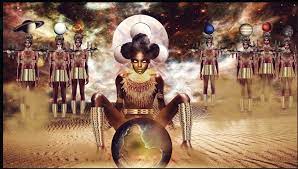War is a common theme in many mythologies across the globe.
Humans have always sought to explain and justify the causes and consequences of violence.
That is why in Africa, a continent with a rich and diverse cultural heritage, there are many gods and goddesses associated with war, each with their own stories, attributes, and powers.
Here are some of the most prominent African gods of war, and how they were honored and worshipped.
1. Ogun: The Yoruba god of iron and war
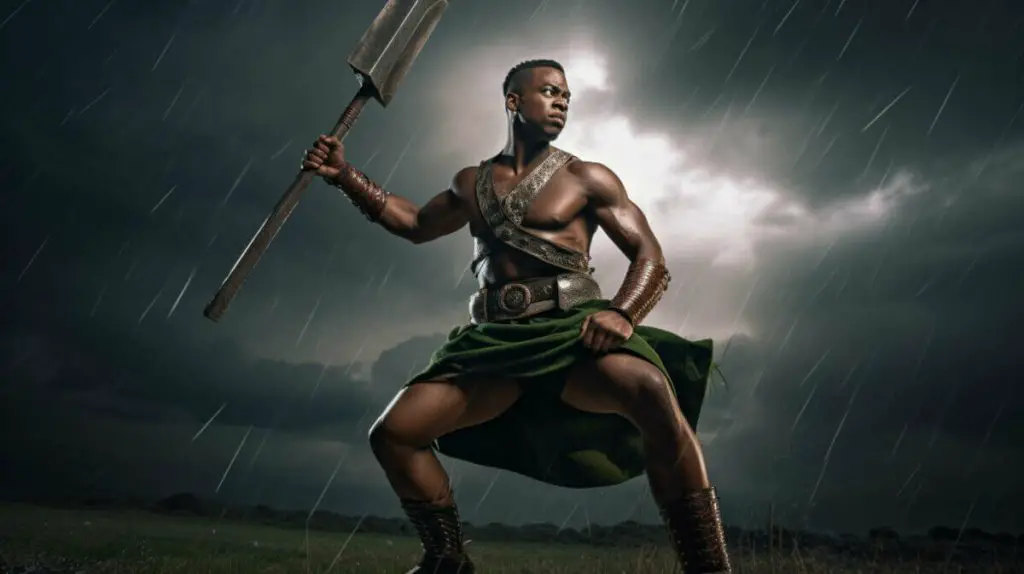
Yoruba community settled in modern southern Nigeria where they established a culture complete with different deities for worshipping.
One of them is Ogun. He rules over iron, metalworking, hunting, warfare, and justice.
He is the patron of blacksmiths, warriors, hunters, and artisans.
He is a fierce and powerful warrior, often carrying a machete or a sword. He is also associated with fire, thunder, and lightning.
Ogun created the first tools and weapons from iron and taught humans how to use them.
He also cleared the path for civilization by cutting down the forests with his machete.
Ogun protects his people, especially against their enemies.
He also ensures fair and honest dealings, as he punishes liars and cheats with his sword.
He manifests in different aspects, such as:
- Ogun Onire (the king of Ire)
- Ogun Akirun (the lord of Kirun)
- Ogun Alara (the lord of wealth)
- Ogun Balendjo (the lord of the sea)
- Ogun Meji (the two-faced Ogun)
- Ogun Olodumare (the Ogun of the supreme god).
2. Kibuka: The Buganda god of war
Kibuka is the war god of the Buganda tribe of Uganda. He is the brother of Mukasa, the lake and fertility god.
He was sent by Ggulu, the sky god, to help his son Kintu rule over the Buganda kingdom.
He was a master strategist and a skilled fighter, who could turn into a cloud and rain weapons on his enemies. He was also invisible and could fly in the air.
Kibuka helped Kintu defeat many enemies and expand his territory.
He also taught the Buganda people how to make weapons and fight in wars.
However, he was killed by an enemy archer who shot him with an arrow while he was resting on a tree.
His death was mourned by the Buganda people, who buried him with honors.
His spirit still watches over the Buganda kingdom and protects it from invaders.
3. Apedemak : The Nubian God of War
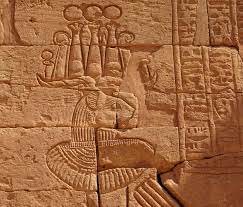
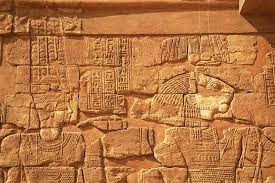
Apedemak was Nubian god of war that was greatly favored by the kings of ancient Kush, a neighboring kingdom to Egypt in the south.
He was often depicted as a man with a lion’s head or, in some cases, with three lion heads at the temple in Naqa.
Apedemak represented the strong authority of the ruling class in Kush.
The kingdom of Kush was a powerful monarchy established around 1070 BC in the fertile Nile Valley and was known for its expertise in ironworking.
The people of Kush believed that Apedemak brought them victory in battles against their enemies.
Whenever Kushite pharaohs went to war, they sought the support and companionship of Apedemak, seeing him as a symbol of triumph and protection.
4. Anhur: The Egyptian god of war and hunting
Anhur is one of the oldest Egyptian gods, dating back to the Old Kingdom period (c. 2686-2181 BCE).
He rules over war, hunting, sky, and solar power.
He is the patron of soldiers, hunters, and athletes.
He is a man with a four-feathered headdress, symbolizing his authority over the four cardinal directions.
He often carries a spear or a lance and sometimes wears a lion’s skin or a shendyt (a kilt-like garment).
Anhur is the son of Ra, the sun god, and his name means sky-bearer or sky-slasher.
He is also known as Onuris, meaning (he who brings back the distant one). This refers to his role in rescuing his wife Mehit, a lioness goddess who was kidnapped by an enemy god.
Anhur fought against Set, the god of chaos and storms, who was also his rival in war and hunting.
5. Gurzil: An ancient Berber god of war
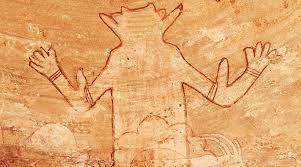
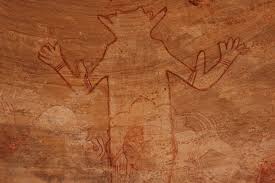
Gurzil was widely revered as the god of war and hunting among the Berbers, mainly in Tripolitania, present-day Libya.
He was believed to be the son of Amun, the supreme god of the Egyptians, and a cow.
He was also associated with the sun, the sky, and the bull.
He was a protector of his people, who carried his image into battle against their enemies.
He was also a source of wisdom and courage for warriors and leaders.
He was sometimes equated with the Roman god Saturn or the Greek god Ares.
6. Maher: The Ethiopian god of war
Maher is the god of war in Ethiopian mythology, which is influenced by both Christian and Islamic traditions.
He was the son of the main god Ashtar, and his counterpart was Beher, the god of the sea.
He was part of a trinity of pre-Christian Eritrean and Ethiopian religions, together with Astar (god of the sun and moon) and Beher (god of the sea).
Maher or Mahrem held a place of special importance with the Axumites such that the gods of the pagan period were all called the “Sons of the Invincible Mahrem.”
He was worshipped mainly in Tripolitania, a region in present-day Libya.
He was believed to be the son of Amun, the supreme god of the Egyptians, and a cow.
He was also associated with the sun, the sky, and the bull.
He was a protector of his people, who carried his image into battle against their enemies, a source of wisdom and courage for warriors and leaders.
7. Sekhmet: The Egyptian goddess of war and healing
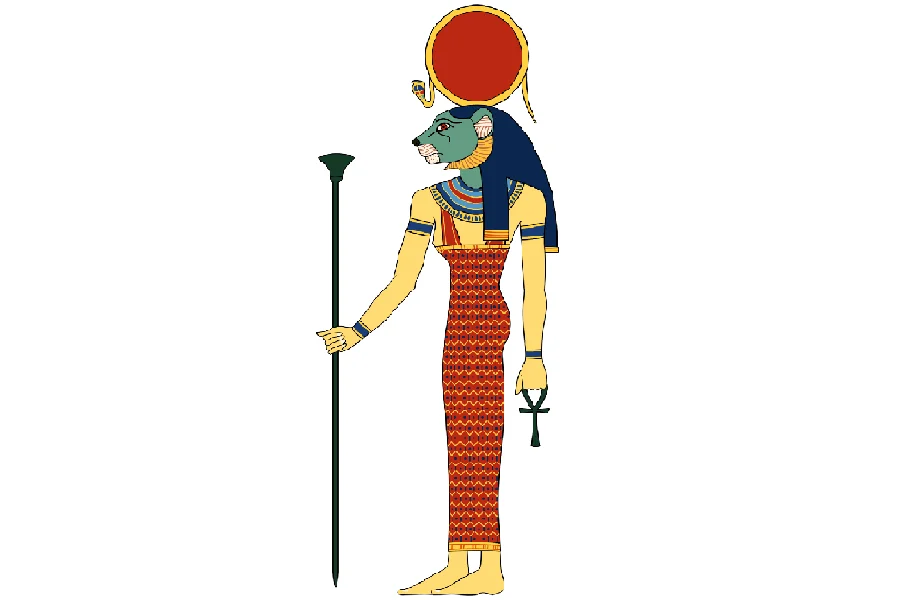
Sekhmet was a powerful Egyptian goddess of war, portrayed with a lioness head and associated with destruction and pestilence, as well as healing and protection.
Revered as the “Eye of the Sun,” she embodies both a dazzling and protective aspect of the creator god.
With a lioness head and a blood-red presence, Sekhmet’s fearsome appearance matches her role as the goddess of destruction and pestilence, sent by her father Ra to hold humans accountable.
Her name, “the Powerful one,” signifies her capacity to give life and fertility, symbolized by the papyrus-scepter and the ankh-sign she carries.
A symbol of balance, Sekhmet could cure plagues and cease hazardous desert winds, offering protection to pharaohs and guiding them to the afterlife.
Her worship alongside Ra at Heliopolis dates back to the early Old Kingdom, marking her enduring and significant role in Egyptian culture.
8. Adzobo: The Fon-Ewe divinity of war
Adzobo is the divinity of war among the Fon-Ewe people of Benin.
He is one of the vodun (spirits) who serve Mawu-Lisa, the supreme creator god.
He is responsible for sanctioning wars and deciding their outcomes.
He is also the guardian of warriors, soldiers, hunters, and fighters.
He is depicted as a muscular man with a red face and eyes, wearing a leopard skin and carrying a spear or a bow.
9. Tano: The thunder god of the Akan and Agni
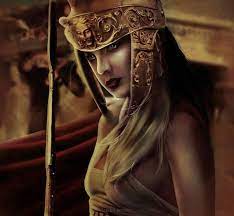
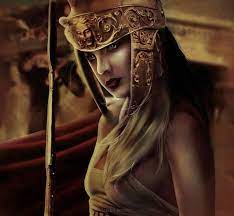
The Akan and Agni communities of West Africa share a common belief in Tano, the god of war and thunder.
Tano, whose true name is Ta Kora, is also associated with the Tano River and the rock promontory from which it springs.
He is a powerful and fierce warrior who can shapeshift and wield various weapons, such as swords, guns, and lightning.
He is also a healer and a protector of his people, who invoke him in times of conflict and crisis.
He is revered as the father of many other deities and spirits and as the highest of the Tano abosom, or river gods.
He has many names and epithets that reflect his attributes and functions, such as Asuhyia Tano (the blessed waters of Tano), Nana Ko Nim (the one who wins wars), Obomuhene (king within the rock), and Tano Okoradie (Tano the savior).
11. Horus: Egyptian God of war, hunt, and protection
Horus is one of the oldest and most significant Egyptian gods, and holds multifaceted roles as the god of war, hunting, and protection.
Often depicted as a falcon or a man with a falcon’s head, he embodies the essence of the sky and is closely associated with celestial elements.
Horus is also known as the Egyptian sun god, honored for his role in creating the sky.
According to the Osiris myth, he is the son of Isis and Osiris, conceived to avenge his father’s murder by his uncle Seth.
A symbol of divine kingship, Horus’s legendary battles with Seth resulted in the loss of his left eye, later restored by the god Thoth, thereby explaining the phases of the moon.
As time passed, Horus came to represent all falcon gods, cementing his place as a respected deity in Egyptian mythology.
12. Ekwensu: The Igbo God of War and victory
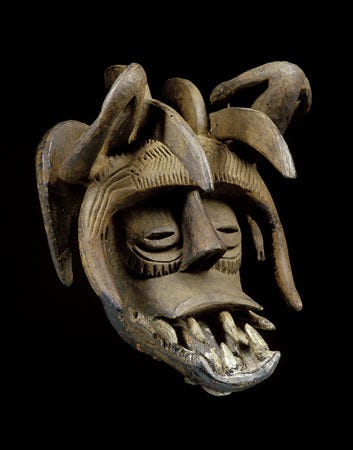
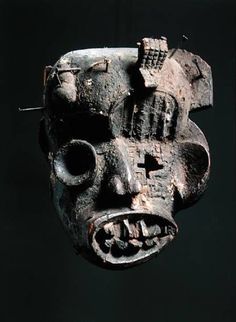
Ekwensu is the Igbo god of war, known for his mischievous and unpredictable nature.
He possesses the power to disrupt the natural order, causing confusion and chaos.
Despite his mischievous nature, Ekwensu holds significant importance in Igbo mythology and is believed to grant victory in battles when invoked.
As one of the sons of “Chi Ukwu,” the god of creation, he plays a vital role in Igbo cosmology.
He is also respected by traders for his craftiness in negotiations and trade.
His intriguing personality and diverse attributes make him a captivating and central figure in Igbo culture, showcasing the richness of their belief system and the importance of this war deity.
Other Notable Mentions
- Egyptian’s Anat, Anuke, Apedemak, Bast, Maahes, Menhit, Montu, Neith, Pakhet, Satis, Set, Sobek, Sopdu, and Wepwawet
- Kipsigis’ (Kenya) Boryet
- Yoruba’s Oya and Kokou
- Igbo’s Amadioha
These are just some of the many African gods of war that have been worshipped and honored throughout history.
They reflect the diversity and richness of African cultures and traditions, as well as their resilience and adaptability in the face of challenges.
They also show us how humans have always sought divine intervention and inspiration in their struggles and aspirations.
How African Gods of War Were Worshipped and Honored
African gods of war were diverse and varied across different regions and tribes.
They were often associated with natural phenomena such as thunder, lightning, iron, or animals.
They were worshipped and honored in different ways, depending on their attributes and functions.
Some common ways of honoring them were offering sacrifices, performing rituals, invoking their names, wearing their symbols, or building shrines or temples for them.
For instance, Ogun was worshipped with animal sacrifices, especially dogs and snails. He was honored by wearing iron bracelets or necklaces, or by carrying iron tools or weapons.
Kibuka was worshipped by consulting his oracle before going to war, and by offering him millet beer and roasted meat.
He was honored by wearing white clothes and feathers, or by playing drums and flutes.
The other gods in our list were also worshiped in various ways, influenced by the unique cultures and beliefs of the respective communities.
Can individuals still connect with or pray to African gods of war in modern times?
This is a question that may arise from curiosity, interest, or personal devotion.
The answer is not simple, as different African traditions have different views and practices regarding their gods of war.
The concept of war may refer to physical conflict, but also to spiritual warfare, ancestral protection, justice, or social change.
Therefore, the gods of war are not only associated with violence and destruction, but also with courage, strength, leadership, and transformation.
Each of the deities has its history, personality, attributes, and rituals.
It is important to acknowledge the challenges of connecting with or praying to African gods of war in modern times.
Some challenges may include the loss or distortion of ancestral knowledge, the stigma or persecution of African religions, the cultural appropriation or commodification of African spirituality, and the ethical dilemmas of engaging in war or violence in a globalized world.
Nevertheless, individuals still connect with or pray to African gods of war in modern times.
They do so with awareness, respect, and responsibility. However, those that have no idea where to start need to learn from authentic sources, consult with elders or practitioners, and honor the gods of war according to their traditions and contexts.
You may also want to check:
12 Most Important African Gods of Wealth

